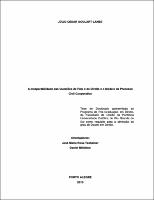| Share record |


|
Please use this identifier to cite or link to this item:
https://tede2.pucrs.br/tede2/handle/tede/4235Full metadata record
| DC Field | Value | Language |
|---|---|---|
| dc.creator | Lanes, Júlio Cesar Goulart | - |
| dc.creator.Lattes | http://buscatextual.cnpq.br/buscatextual/visualizacv.do?id=K4717435Y1 | por |
| dc.contributor.advisor1 | Tesheiner, José Maria Rosa | - |
| dc.contributor.advisor1Lattes | http://buscatextual.cnpq.br/buscatextual/visualizacv.do?id=K4703605P4 | por |
| dc.date.accessioned | 2015-04-14T14:34:03Z | - |
| dc.date.available | 2014-01-22 | - |
| dc.date.issued | 2013-12-12 | - |
| dc.identifier.citation | LANES, Júlio Cesar Goulart. A inseparabilidade das questões de fato e de direito e o modelo de processo civil cooperativo. 2013. 2 f. Tese (Doutorado em Direito) - Pontifícia Universidade Católica do Rio Grande do Sul, Porto Alegre, 2013. | por |
| dc.identifier.uri | http://tede2.pucrs.br/tede2/handle/tede/4235 | - |
| dc.description.resumo | Utilizando-se das diretrizes do modelo de processo civil cooperativo, a tese proposta tem como objetivo demonstrar a inseparabilidade entre as questões de fato e as questões de direito. Reconhecendo-se que a teoria do direito e, em especial, a teoria da interpretação influenciam a jurisdição, é necessário retroagir para compreender a evolução da problemática do trato dos elementos fático-jurídicos da causa. Identificada a teoria cognitivista da interpretação jurídica, também conhecida como formalista, que reconhece a radical separação entre fato e direito, são estudadas as seguintes correntes do pensamento jurídico: a Escola da Exegese, a Jurisprudência dos Conceitos, a Escola Histórica do Direito, a Escola do Direito Livre, a Jurisprudência dos Interesses e a Tópica Jurídica. Em alternativa, segundo as linhas da teoria ceticista, também denominada de antiformalista, seja pela sua vertente lógico-argumentativa, seja pela contribuição da hermenêutica filosófica, constata-se que não se deve pressupor o isolamento e a ausência de recíproca implicação entre fato e direito no processo de interpretação e aplicação do direito. Partindo-se dos resultados encontrados, transfere-se e aplica-se a mesma dialética entre a teoria cognitivista e a ceticista no enfretamento dos seguintes temas processuais: direito à ação, direito à prova, direito à fundamentação, todos inerentes à justa estruturação do processo civil. Nesse confronto, em especial, verifica-se a inseparabilidade entre as questões de fato e as questões de direito, beneficiadora da organização do processo e do encontro cooperativo da decisão justa da causa. | por |
| dc.description.abstract | By making use of the guidelines in the cooperative civil lawsuit model, the thesis proposed herein is meant to show that points of fact and points of law are inseparable. As we acknowledge that the theory of law and especially the theory of interpretation influence jurisdiction, we need to go back to understand how the problem of dealing with the case's factual-legal elements has evolved. Under the cognitive theory of legal interpretation, also known as formalist, which recognizes the radical separation between fact and law, we are going to study the following schools of legal reasoning: the School of Exegesis, the Jurisprudence of Concepts, the Historic School of Law, the School of Free Law, the Jurisprudence of Interests, and Legal Topics. Alternatively, along the lines of the skeptical theory, also called antiformalist, whether from its logic-argumentative side or for the contribution from philosophical hermeneutics, we find that we should not assume the isolation and the absence of reciprocal implication between fact and right in the process of interpreting and applying the Law. Based on the results found, we are going to transfer and apply the same dialectics between the cognitive and skeptical theories to address the following lawsuit issues: the right to sue, right to evidence, and right to state reasons, all of them inherent to properly putting together a civil lawsuit. Especially from that confrontation we realize that points of fact and points of law are inseparable, which helps put together the case and cooperatively reach its fair decision. | eng |
| dc.description.provenance | Made available in DSpace on 2015-04-14T14:34:03Z (GMT). No. of bitstreams: 1 453300.pdf: 428197 bytes, checksum: 8741462bb3505c82bc7ad50221cc07fb (MD5) Previous issue date: 2013-12-12 | eng |
| dc.format | application/pdf | por |
| dc.thumbnail.url | http://tede2.pucrs.br:80/tede2/retrieve/14537/453300.pdf.jpg | * |
| dc.language | por | por |
| dc.publisher | Pontifícia Universidade Católica do Rio Grande do Sul | por |
| dc.publisher.department | Faculdade de Direito | por |
| dc.publisher.country | BR | por |
| dc.publisher.initials | PUCRS | por |
| dc.publisher.program | Programa de Pós-Graduação em Direito | por |
| dc.rights | Acesso Aberto | por |
| dc.subject | DIREITO | por |
| dc.subject | DIREITO PROCESSUAL CIVIL | por |
| dc.subject | TEORIA DO DIREITO | por |
| dc.subject | HERMENÊUTICA (DIREITO) | por |
| dc.subject.cnpq | CNPQ::CIENCIAS SOCIAIS APLICADAS::DIREITO | por |
| dc.title | A inseparabilidade das questões de fato e de direito e o modelo de processo civil cooperativo | por |
| dc.type | Tese | por |
| Appears in Collections: | Programa de Pós-Graduação em Direito | |
Files in This Item:
| File | Description | Size | Format | |
|---|---|---|---|---|
| 453300.pdf | Texto Parcial | 418.16 kB | Adobe PDF |  Download/Open Preview |
Items in DSpace are protected by copyright, with all rights reserved, unless otherwise indicated.




